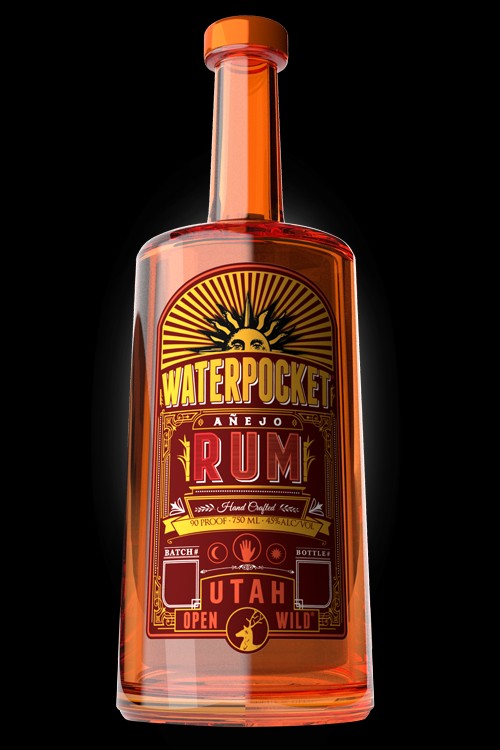

Today we’d like to introduce you to Alan Scott. Them and their team share their story with us below:
Waterpocket Distillery was founded by husband and wife Alan and Anna Scott. We combined Alan’s 20 years of experience with homebrewing, winemaking, and kitchen fermentations – with Anna’s chemistry experience (first as an undergraduate in chemical engineering, later a Ph.D. in biochemistry) to make Waterpocket.
Together, Alan and Anna lived overseas primarily in Europe for 3 years just prior to moving to Utah. There they were exposed to a variety of fruit, botanical, and bittersweet spirits very different from the traditional favorites commonly seen in their MidWestern upbringing (Oklahoma and Kansas). So in 2017, they started Waterpocket Distillery, named after the Waterpocket Fold, the primary geological feature of Capitol Reef National Park. So Alan and Anna wanted to create a line of spirits, inspired by the wild backcountry landscape of Utah and the spirit of adventure that leads so many to the beauty of our state.
In the first years, they created several “lines” of spirits, including house spirits such as rum, gin, plum brandy, and kummel, amaros, and bitters under the Toadstool label (named after the hoodoos and “mushroom” formations found in many Utah canyons), a distillers passion project for vintage botanical spirits called Long Lost, and a line of curated whiskies called Robbers Roost. Built around twin Mueller copper pot stills imported from Germany, the heart of the distillery is the development lab, where unique flavors are researched and developed. In the first years, many of the distilleries spirits made their way to Utah’s best cocktail bars, adding new dimensions in flavor to a wide range of locally made craft cocktails.
Partnership with cocktail creators and institutions has been a cornerstone of the distillery since the beginning. The distillery has been featured in national spirit publications and has earned many awards from prestigious spirits competitions nationwide, including a double-gold medal for Temple of the Moon gin at the San Francisco International Spirit Awards, the top competition in the USA.
I’m sure you wouldn’t say it’s been obstacle-free, but so far would you say the journey has been a fairly smooth road?
It’s never been a smooth road. Our biggest challenges are the practices and culture of the DABC. Initially, many didn’t believe a decent amaro could be made in Utah or other high-quality craft spirits. The best players in the local industry have been laboring to prove this fear wrong, especially in the last few years.
We also face a challenge of defining “craft” and how it stands, in contrast, to purely “rebottling” or “rectifying” operations or products (in other words, the distilleries who have and use stills vs those that don’t). Recent mass delistings at the DABC have compounded the challenges local producers face, perhaps existentially threatening their futures.
Thanks – so what else should our readers know about your work and what you’re currently focused on?
The creative work of the Toadstool amaro, and Long Lost botanical spirits are two of the things that have gained us notoriety. We’ve done more high-quality work with botanical spirits than any other local distillery.
Our Temple of the Moon gin won double-gold at perhaps the most competitive spirits contest in the nation. We’ve introduced kummel (a german style caraway liqueur), 3 styles of amaro (we were the first true Utah amaro produced), and long-lost botanical spirits from the Danziger, N. Italian alpine, and Provencal Carmelite traditions.
We pioneered a fully-transparent method of marketing sourced spirits under our Robbers Roost line, but also made creative modifications to these spirits such as a whiskey macerated in real local fruit, and a whiskey liqueur based on a 17th-century British spirit.
We’ve been enthusiastically embraced in cocktail creations by fine cocktail bars such as Bar-X, Copper Common, Copper Kitchen, HSL, Water Witch, Bodega/The Rest, Alibi, East Liberty Tap House, BTG wine bar, and many more.
What would you say have been one of the most important lessons you’ve learned?
Can’t say that only one stands out… because you make so many mistakes starting up a new business.
One important one is that a producer in Utah should never underestimate the desire of the state liquor monopoly to control the alcohol businesses operating here. Their core culture is one of enforcement, with sales coming a distant second.
More than once they have made public that they owe local businesses nothing (this may be changing, but not yet in the policy). So the DABC, plus, our local Utah alcohol laws function as an enormous brake on the growth of local breweries, wineries, and distilleries.
And a huge bias exists in the system towards high-volume cheap booze… practically the opposite of what a true craft distillery aspires to produce. There are many more lessons learned, but that may be the most important of all.
Contact Info:
- Email: spirits@waterpocket.co
- Website: www.waterpocket.co
- Instagram: instagram.com/waterpocketdistillery
- Facebook: facebook.com/waterpocketdistillery
- Twitter: twitter.com/waterpocketdist










Image Credits
Michael Origin, Mitch Meyer, Dan Hammond, and Adam Bagby











